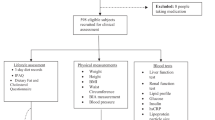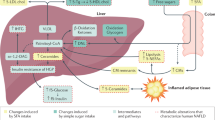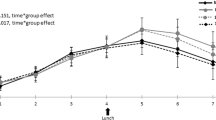Abstract
Background:
Excessive energy intake and obesity lead to the metabolic syndrome (MetS). Dietary saturated fatty acids (SFAs) may be particularly detrimental on insulin sensitivity (SI) and on other components of the MetS.
Objective:
This study determined the relative efficacy of reducing dietary SFA, by isoenergetic alteration of the quality and quantity of dietary fat, on risk factors associated with MetS.
Design:
A free-living, single-blinded dietary intervention study.
Subjects and Methods:
MetS subjects (n=417) from eight European countries completed the randomized dietary intervention study with four isoenergetic diets distinct in fat quantity and quality: high-SFA; high-monounsaturated fatty acids and two low-fat, high-complex carbohydrate (LFHCC) diets, supplemented with long chain n-3 polyunsaturated fatty acids (LC n-3 PUFAs) (1.2 g per day) or placebo for 12 weeks. SI estimated from an intravenous glucose tolerance test (IVGTT) was the primary outcome measure. Lipid and inflammatory markers associated with MetS were also determined.
Results:
In weight-stable subjects, reducing dietary SFA intake had no effect on SI, total and low-density lipoprotein cholesterol concentration, inflammation or blood pressure in the entire cohort. The LFHCC n-3 PUFA diet reduced plasma triacylglycerol (TAG) and non-esterified fatty acid concentrations (P<0.01), particularly in men.
Conclusion:
There was no effect of reducing SFA on SI in weight-stable obese MetS subjects. LC n-3 PUFA supplementation, in association with a low-fat diet, improved TAG-related MetS risk profiles.
This is a preview of subscription content, access via your institution
Access options
Subscribe to this journal
Receive 12 print issues and online access
$259.00 per year
only $21.58 per issue
Buy this article
- Purchase on Springer Link
- Instant access to full article PDF
Prices may be subject to local taxes which are calculated during checkout



Similar content being viewed by others
References
Carr DB, Utzschneider KM, Hull RL, Kodama K, Retzlaff BM, Brunzell JD et al. Intra-abdominal fat is a major determinant of the National Cholesterol Education Program Adult Treatment Panel III criteria for the metabolic syndrome. Diabetes 2004; 53: 2087–2094.
Isomaa B, Almgren P, Tuomi T, Forsen B, Lahti K, Nissen M et al. Cardiovascular morbidity and mortality associated with the metabolic syndrome. Diabetes Care 2001; 24: 683–689.
Grundy SM, Cleeman JI, Daniels SR, Donato KA, Eckel RH, Franklin BA et al. Diagnosis and management of the metabolic syndrome: an American Heart Association/National Heart, Lung, and Blood Institute Scientific Statement. Circulation 2005; 112: 2735–2752.
Ford ES . Risks for all-cause mortality, cardiovascular disease, and diabetes associated with the metabolic syndrome: a summary of the evidence. Diabetes Care 2005; 28: 1769–1778.
Wilson PW, D’Agostino RB, Parise H, Sullivan L, Meigs JB . Metabolic syndrome as a precursor of cardiovascular disease and type 2 diabetes mellitus. Circulation 2005; 112: 3066–3072.
Schenk S, Saberi M, Olefsky JM . Insulin sensitivity: modulation by nutrients and inflammation. J Clin Invest 2008; 118: 2992–3002.
International Diabetes Federation. The IDF consensus worldwide definition of the metabolic syndrome. (available from www.idf.org ) 2005. [cited; Available from:.
ATPIIINCEP. Third Report of the National Cholesterol Education Program (NCEP) Expert Panel on Detection, Evaluation, and Treatment of High Blood Cholesterol in Adults (Adult Treatment Panel III) final report. Circulation 2002; 106: 3143–3421.
Orchard TJ, Temprosa M, Goldberg R, Haffner S, Ratner R, Marcovina S et al. The effect of metformin and intensive lifestyle intervention on the metabolic syndrome: the Diabetes Prevention Program randomized trial. Ann Intern Med 2005; 142: 611–619.
Mensink M, Blaak EE, Corpeleijn E, Saris WH, de Bruin TW, Feskens EJ . Lifestyle intervention according to general recommendations improves glucose tolerance. Obes Res 2003; 11: 1588–1596.
Knowler WC, Barrett-Connor E, Fowler SE, Hamman RF, Lachin JM, Walker EA et al. Reduction in the incidence of type 2 diabetes with lifestyle intervention or metformin. N Engl J Med 2002; 346: 393–403.
Roche HM . Fatty acids and the metabolic syndrome. Proc Nutr Soc 2005; 64: 23–29.
Storlien LH, Baur LA, Kriketos AD, Pan DA, Cooney GJ, Jenkins AB et al. Dietary fats and insulin action. Diabetologia 1996; 39: 621–631.
Marshall JA, Hoag S, Shetterly S, Hamman RF . Dietary fat predicts conversion from impaired glucose tolerance to NIDDM. The San Luis Valley Diabetes Study. Diabetes Care 1994; 17: 50–56.
Feskens EJ, Virtanen SM, Rasanen L, Tuomilehto J, Stengard J, Pekkanen J et al. Dietary factors determining diabetes and impaired glucose tolerance. A 20-year follow-up of the Finnish and Dutch cohorts of the Seven Countries Study. Diabetes Care 1995; 18: 1104–1112.
Melanson EL, Astrup A, Donahoo WT . The relationship between dietary fat and fatty acid intake and body weight, diabetes, and the metabolic syndrome. Annals of Nutrition & Metabolism 2009; 55: 229–243.
Warensjo E, Riserus U, Vessby B . Fatty acid composition of serum lipids predicts the development of the metabolic syndrome in men. Diabetologia 2005; 48: 1999–2005.
Vessby B, Unsitupa M, Hermansen K, Riccardi G, Rivellese AA, Tapsell LC et al. Substituting dietary saturated for monounsaturated fat impairs insulin sensitivity in healthy men and women: The KANWU Study. Diabetologia 2001; 44: 312–319.
Perez-Jimenez F, Lopez-Miranda J, Pinillos MD, Gomez P, Paz-Rojas E, Montilla P et al. A mediterranean and a high-carbohydrate diet improve glucose metabolism in healthy young persons. Diabetologia 2001; 44: 2038–2043.
Vega-Lopez S, Ausman LM, Jalbert SM, Erkkila AT, Lichtenstein AH . Palm and partially hydrogenated soybean oils adversely alter lipoprotein profiles compared with soybean and canola oils in moderately hyperlipidemic subjects. Am J Clin Nutr 2006; 84: 54–62.
Christiansen E, Schnider S, Palmvig B, Tauber-Lassen E, Pedersen O . Intake of a diet high in trans monounsaturated fatty acids or saturated fatty acids. Effects on postprandial insulinemia and glycemia in obese patients with NIDDM. Diabetes Care 1997; 20: 881–887.
Summers LK, Fielding BA, Bradshaw HA, Ilic V, Beysen C, Clark ML et al. Substituting dietary saturated fat with polyunsaturated fat changes abdominal fat distribution and improves insulin sensitivity. Diabetologia 2002; 45: 369–377.
Popp-Snijders C, Schouten JA, Heine RJ, van der Meer J, van der Veen EA . Dietary supplementation of omega-3 polyunsaturated fatty acids improves insulin sensitivity in non-insulin-dependent diabetes. Diabetes Res 1987; 4: 141–147.
Fasching P, Ratheiser K, Waldhausl W, Rohac M, Osterrode W, Nowotny P et al. Metabolic effects of fish-oil supplementation in patients with impaired glucose tolerance. Diabetes 1991; 40: 583–589.
Vessby B . Effects of omega 3 fatty acids on glucose and lipid metabolism in non-insulin-dependent diabetes mellitus. World Review of Nutrition and Dietetics 1991; 66: 407–416.
Griffin MD, Sanders TA, Davies IG, Morgan LM, Millward DJ, Lewis F et al. Effects of altering the ratio of dietary n-6 to n-3 fatty acids on insulin sensitivity, lipoprotein size, and postprandial lipemia in men and postmenopausal women aged 45–70 y: the OPTILIP Study. Am J Clin Nutr 2006; 84: 1290–1298.
Kabir M, Skurnik G, Naour N, Pechtner V, Meugnier E, Rome S et al. Treatment for 2 mo with n 3 polyunsaturated fatty acids reduces adiposity and some atherogenic factors but does not improve insulin sensitivity in women with type 2 diabetes: a randomized controlled study. Am J Clin Nutr 2007; 86: 1670–1679.
Roche HM, Gibney MJ . Effect of long-chain n−3 polyunsaturated fatty acids on fasting and postprandial triacylglycerol metabolism. Am J Clin Nutr 2000; 71 (1 Suppl): 232S–237S.
Shaw DI, Tierney AC, McCarthy S, Upritchard J, Vermunt S, Gulseth HL et al. LIPGENE food-exchange model for alteration of dietary fat quantity and quality in free-living participants from eight European countries. Br J Nutr 2008; 101: 750–759.
Finegood DT, Hramiak IM, Dupre J . A modified protocol for estimation of insulin sensitivity with the minimal model of glucose kinetics in patients with insulin-dependent diabetes. J Clin Endocrinol Metab 1990; 70: 1538–1549.
Moloney F, Yeow TP, Mullen A, Nolan JJ, Roche HM . Conjugated linoleic acid supplementation, insulin sensitivity, and lipoprotein metabolism in patients with type 2 diabetes mellitus. Am J Clin Nutr 2004; 80: 887–895.
Phillips CM, Goumidi L, Bertrais S, Ferguson JF, Field MR, Kelly ED et al. Complement component 3 polymorphisms interact with polyunsaturated fatty acids to modulate risk of metabolic syndrome. Am J Clin Nutr 2009; 90: 1665–1673.
Batal R, Tremblay M, Barrett PH, Jacques H, Fredenrich A, Mamer O et al. Plasma kinetics of apoC-III and apoE in normolipidemic and hypertriglyceridemic subjects. J Lipid Res 2000; 41: 706–718.
Fredenrich A . Role of apolipoprotein CIII in triglyceride-rich lipoprotein metabolism. Diabetes Metab 1998; 24: 490–495.
Magkos F, Patterson BW, Mohammed BS, Klein S, Mittendorfer B . Women produce fewer but triglyceride-richer very low-density lipoproteins than men. J Clin Endocrinol Metab 2007; 92: 1311–1318.
Mittendorfer B, Patterson BW, Klein S . Effect of sex and obesity on basal VLDL-triacylglycerol kinetics. Am J Clin Nutr 2003; 77: 573–579.
Burdge GC, Calder PC . Conversion of alpha-linolenic acid to longer-chain polyunsaturated fatty acids in human adults. Reproduction, Nutrition, Development 2005; 45: 581–597.
Roche HM, Zampelas A, Knapper JM, Webb D, Brooks C, Jackson KG et al. Effect of long-term olive oil dietary intervention on postprandial triacylglycerol and factor VII metabolism. Am J Clin Nutr 1998; 68: 552–560.
Lefevre M, Champagne CM, Tulley RT, Rood JC, Most MM . Individual variability in cardiovascular disease risk factor responses to low-fat and low-saturated-fat diets in men: body mass index, adiposity, and insulin resistance predict changes in LDL cholesterol. Am J Clin Nutr 2005; 82: 957–963 quiz 1145–1146.
Petersson H, Riserus U, McMonagle J, Gulseth HL, Tierney AC, Morange S et al. Effects of dietary fat modification on oxidative stress and inflammatory markers in the LIPGENE study. Br J Nutr 2010; 23: 1–6.
Acknowledgements
LIPGENE was funded by the EU 6 Framework Food Safety & Quality Programme, Contract no. 505944, ‘Diet, genomics, and the metabolic syndrome: an integrated nutrition, agro-food, social and economic analysis.’ Funds were also obtained from the Norwegian Foundation for Health and Rehabilitation, South-Eastern Norway Regional Health Authority, the Johan Throne Holst Foundation for Nutrition Research and the Freia Medical Research Foundation. We thank Dr John Kearney for advice on statistical analyses. We gratefully acknowledge the study subjects participating in the 12-week intervention study. HMR, MJG, CMW, CAD, JAL, WHMS, EEB, CAD, BV, BK, ADK and JLM designed the research. ACT, JMM, DIS, HLG, OH, JAP and IGL implemented the dietary intervention, completed biochemical analysis and analysed the data; ACT and HMR wrote the paper. HMR had primary responsibility for final content. All authors read and approved the final paper. This study was supported by the EU Sixth Framework Food Safety & Quality Programme, Contract Number (FOOD-2003-CT-505944). Intervention Foods supplied by Unilever Best Foods, Vlaardingen, The Netherlands. LC n-3 PUFA supplement (Marinol C-38; 1.24 g per day LC n-3 PUFA) and placebo high-oleic acid sunflower seed oil supplement were supplied by Lipid Nutrition, Loders Croklaan Wormerveer, The Netherlands.
Author information
Authors and Affiliations
Corresponding author
Ethics declarations
Competing interests
The authors declare no conflict of interest.
Additional information
Supplementary Information accompanies the paper on International Journal of Obesity website
Supplementary information
Rights and permissions
About this article
Cite this article
Tierney, A., McMonagle, J., Shaw, D. et al. Effects of dietary fat modification on insulin sensitivity and on other risk factors of the metabolic syndrome—LIPGENE: a European randomized dietary intervention study. Int J Obes 35, 800–809 (2011). https://doi.org/10.1038/ijo.2010.209
Received:
Revised:
Accepted:
Published:
Issue Date:
DOI: https://doi.org/10.1038/ijo.2010.209
Keywords
This article is cited by
-
Body composition and body fat distribution in tissue-specific insulin resistance and in response to a 12-week isocaloric dietary macronutrient intervention
Nutrition & Metabolism (2024)
-
Association of birth weight with type 2 diabetes mellitus and the mediating role of fatty acids traits: a two-step mendelian randomization study
Lipids in Health and Disease (2024)
-
The roles of dietary lipids and lipidomics in gut-brain axis in type 2 diabetes mellitus
Journal of Translational Medicine (2023)
-
Diet and metabolic syndrome: a narrative review
Internal and Emergency Medicine (2023)
-
Sexual dimorphism in cardiometabolic health: the role of adipose tissue, muscle and liver
Nature Reviews Endocrinology (2021)



